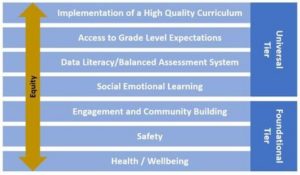Des Moines Public Schools is busier this summer than any summer before it. Thousands of students and teachers are working in classrooms, and district leadership launched the Leadership Institute this week to engage school leaders to align, design, and execute strategic plans in service of students utilizing community input, hard-won perspective on inequities, and best practices shared between urban districts all over the country.
“Our COVID year has shone a spotlight on the many inequities that have existed for a long time,” said Executive Director of Teaching and Learning Noelle Nelson. “It has required us to sharpen our focus and get crystal clear on the priorities that have emerged from our community and students. We spent all of second semester preparing for a successful launch of the upcoming school year, knowing that we need to expect aggressive growth to address our gaps.”
The Leadership Institute this week is about introducing school leaders, including principals, associate principals, teacher leaders and instructional coaches, to foundational and universal tiers vital to student success. The levers in each tier were developed in service of goals set by the DMPS school board. They include Social Emotional Learning (SEL) for adults, Engagement and Community Building, Safety, Health and Wellbeing, Equitable Access to High Quality Curriculum, Access to Grade Level Expectations, Data Literacy and a Balanced Assessment System.
A second LI scheduled for August will be about inspiring and equipping school leaders with what they need to implement the work in their buildings.
“The Leadership Institute this year has prepared buildings to develop more school specific plans to approach and monitor actions towards district and school goals by utilizing district identified levers,” said Associate Principal Praveen Bannikatti. “At Roosevelt High School, this allowed us to dive deep into our vision for instruction and our foundational tier, which we will continue to build on the next institute in August.”
Following the August LI, the multi-year program will move into a progress monitoring phase including recording data at each school.
“We will have metrics that will tie to performance and evaluation across all leadership levels in the organization,” Nelson said. “This year the sense of urgency is off the charts, and we are attempting to balance the scales of accountability and support to ensure students get what they need.”
The data will be presented periodically throughout the year to the Board and be available on demand to school and district leadership for review.
View a video of students sharing school experiences played during LI
View photos of Leadership Institute sessions







